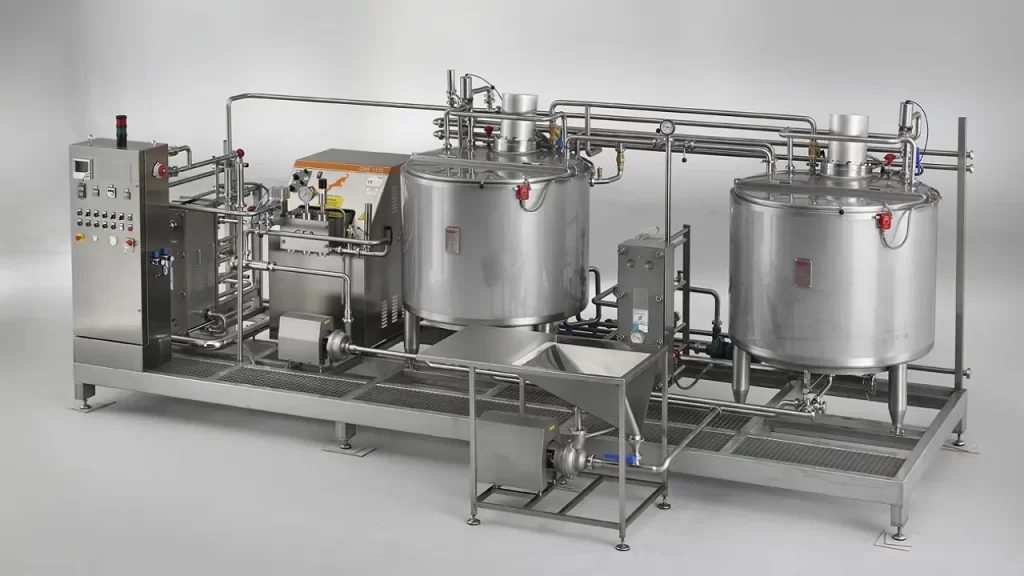For most people, the phrase ice cream conjures up memories of warm summers, slurping melted cones, banana splits, hot fudge sundaes, or buying a 99 cone from the local shop. Ice cream is the ultimate old- fashioned treat. This dessert has a history that stretches across the globe, with different countries enjoying various versions such as kulfi in India, gelato in Italy, and mochi in Japan. It seems every country has its own spin on the delicious frozen confection that we call ice cream.
Production Of Ice Cream
Ice cream is a beloved frozen dessert made from a mixture of milk, cream, sugar, and flavorings. The production process involves several key steps, ensuring a smooth, creamy texture and rich taste.
Ingredients Selection
The primary ingredients include milk, cream, sugar, and stabilizers. Flavoring agents such as vanilla, chocolate, or fruit extracts are added based on the desired flavor. Some recipes also include emulsifiers to improve texture.
Mixing and Pasteurization
The ingredients are blended to form a consistent mixture. This mixture is then pasteurized at around 80–85°C (176–185°F) to eliminate harmful bacteria. Pasteurization also helps dissolve sugar and stabilizers evenly.
Homogenization
After pasteurization, the mixture undergoes homogenization, where high pressure breaks down fat molecules into smaller particles. This process ensures a smoother texture and prevents the formation of ice crystals.
Aging the Mixture
The homogenized mix is cooled and stored at 4°C (39°F) for several hours. This aging process improves the texture and enhances the whipping ability of the mixture, making the final ice cream creamier.
Freezing and Churning
The aged mixture is transferred to a freezing machine, where it is churned continuously. Air is incorporated during this process to give the ice cream a light, fluffy texture. Rapid freezing prevents large ice crystals from forming.
Addition of Mix-ins
At this stage, solid ingredients like chocolate chips, nuts, or fruit pieces are added to the ice cream. These mix-ins are blended evenly before final freezing.
Hardening and Packaging
The ice cream is placed in deep freezers at -25°C (-13°F) to harden before being packaged and distributed. It is then ready to be enjoyed by consumers worldwide.
Production Of Ice Cream Flowchart
Here is a flowchart outlining the production of ice cream:
- Ingredient Selection
↓ - Mixing of Ingredients
↓ - Pasteurization (Heating the mixture to 80–85°C to kill bacteria)
↓ - Homogenization (Breaking down fat molecules for smooth texture)
↓ - Aging the Mixture (Cooling and storing the mixture for several hours)
↓ - Freezing and Churning (Incorporating air and freezing the mixture)
↓ - Addition of Mix-ins (Adding nuts, fruit, or chocolate chips)
↓ - Hardening (Deep freezing at -25°C to firm up the ice cream)
↓ - Packaging (Packing the ice cream into containers)
↓
Distribution (Shipping to retailers or consumers)
Production of Ice Cream Machine
The production of an ice cream machine involves precision engineering and advanced manufacturing processes to ensure efficient and high-quality performance. These machines are essential for commercial and home use, providing consistent freezing and churning for smooth ice cream texture.
Design and Material Selection
Manufacturers begin by designing the machine, selecting durable materials such as stainless steel for hygienic and long-lasting use. Food-grade plastics and rubber components are also used for safety and insulation.
Manufacturing Process
The production process starts with cutting and shaping metal sheets for the machine’s body. Components like the compressor, mixing paddles, and cooling systems are assembled using automated machinery. The refrigeration unit, which maintains optimal freezing, is carefully integrated.
Assembly and Testing
After assembling the machine, rigorous testing is conducted to check performance, energy efficiency, and durability. Quality control ensures the machine can consistently freeze and churn ice cream while maintaining temperature stability.
Final Inspection and Packaging
Before distribution, each unit undergoes a final inspection to meet industry standards. The machines are then packaged securely to prevent damage during transportation and shipped to retailers or customers worldwide.
Why You Need:
Production requirement includes
- dry store for ingredients and packaging
- mixing/ageing vat
- pasteuriser/homogeniser
- ice cream freezer – batch or continuous*
- packing machine/filler
- freezer room
- freezer store (packaged product).
A batch freezer is ideal for small runs and for those starting out in production. A continuous freezer, as the name suggests, works for several hours, as long as ice cream mix is fed into the hopper.
Visit Best Ice Cream Machine Manufacturer in India
Pranam Ji Engineering Works is a leading manufacturer & supplier of Ice Cream Plant, Ice Cream Mix Plant, Natural Ice Cream Mini Plant, 500 liter Ice cream Making Plant, Mini Ice Cream Plant, Automatic Ice Cream Plant, fully automatic ice cream plant, ice cream plant for sale, ice cream plant based, ice cream plant near me, 200 litre ice cream plant price in Uttar Pradesh, India. We have 20+year of experienced expertise, If you are interested so call on 09997737365, 7017598033 or write us at salespranamjiew@gmail.com


